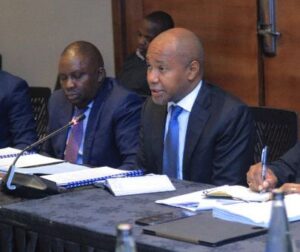
Peter Mwangi, CEO Learn Finance Global. Photo | courtesy.
Financial literacy is one of the critical skills needed for a person to make and keep money. Unfortunately, this skill is not taught in schools or discussed in most social circles whether among friends, family, or colleagues.
As a result, many people grow up with little to no knowledge of money management, leading to poor budgeting habits and contributing to poverty.
According to a study by Springer, financial literacy can effectively and efficiently reduce poverty in both the short and long term. The study also found that financial literacy plays a crucial role in wealth accumulation.
Despite these findings, many individuals remain financially illiterate, which significantly affects their ability to overcome poverty and build wealth.
Peter Mwangi, the founder and CEO of Learn Finance Global a company that offers financial training services told JEDCA MEDIA that the lack of financial literacy can be traced back to upbringing.
ALSO READ: How Livestock Sector Could Benefit From AI Technologies
Peter explains that growing up, parents often failed to teach their children about money management, and at the same time, such lessons were absent from the school curriculum.
He adds that financial illiteracy can have devastating effects on an individual’s stability.
“Finances are the pillars of society, yet they were completely overlooked when we were growing up. I wasn’t taught how to save or manage money. All I was told was to go to school and get a job. There’s a mindset we inherited that money is evil. We weren’t taught how to earn money, budget for bills, or buy things for ourselves. That’s why most people struggle with money management,” Peter says.
Building Wealth
According to Peter, financial literacy is vital in both creating and sustaining wealth. He believes ignorance is the root cause of most financial problems.
“One of the biggest issues affecting Africans is ignorance. We are too ignorant to learn about finances, yet we’re quick to complain when we don’t have money,” he notes.
He emphasizes that budgeting is one of the main pillars of financial literacy, helping individuals avoid vices such as impulse buying and overspending habits that often lead to debt and financial instability.
“Budgeting is crucial. You need to plan your daily expenditure in advance. It prevents overspending and impulse buying, helping you build financial discipline. Money that you don’t budget for ends up spending itself,” Peter warns.
Emmah Wamboi, a digital financial literacy expert, adds that financial literacy not only enables people to make money but also protects them from falling prey to scams, especially online.
In recent years, online fraudsters have increasingly targeted unsuspecting Kenyans by luring them with seemingly lucrative investment opportunities.
Emmah says that financially illiterate individuals are more vulnerable to such scams due to a lack of basic knowledge about finances and investments.

“You need digital literacy skills to protect your money. Without them, you’re likely to fall victim to scammers. Many people have already been scammed online,” Emmah says.
With the rise of the gig economy and online income opportunities, she argues that financial literacy is more indispensable than ever. Thanks to the internet, learning finance has become much more accessible.
“Young people should learn how to monetize their skills online, but more importantly, they must learn how to manage that money. Apps and online platforms have made all this possible,” she explains.
Peter adds that young people should read personal finance books to deepen their understanding of money management.
“At Learn Finance Global, we offer financial training and mentorship, working with professionals in the banking and finance sectors. However, it’s also important to do your own research, read personal finance books, and study how wealthy people manage their finances,” he advises.
“Finances should be an open conversation. Money isn’t everything but the lack of it affects everything. Parents should be transparent with their children about financial matters so that they can understand how money works from a young age.”






